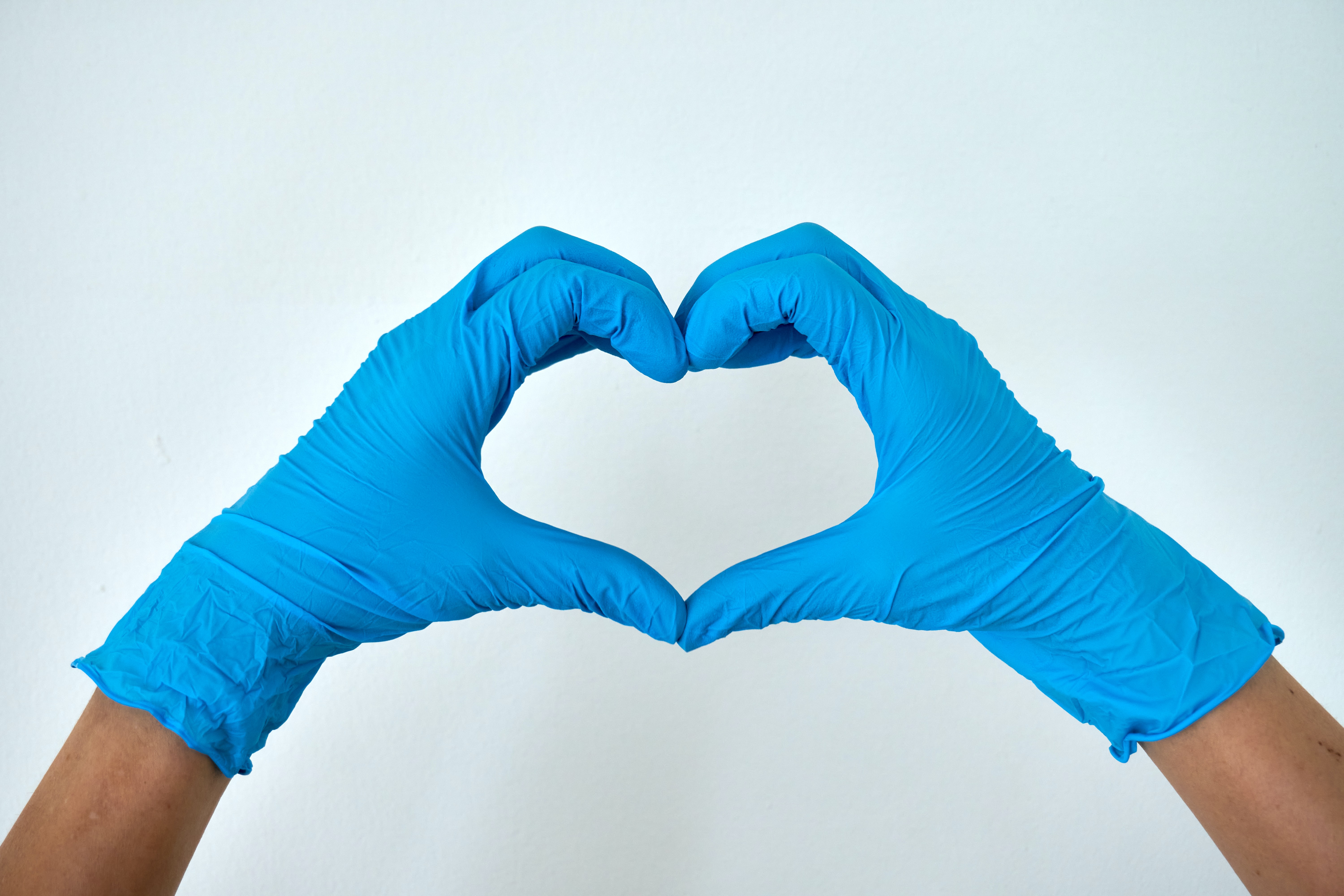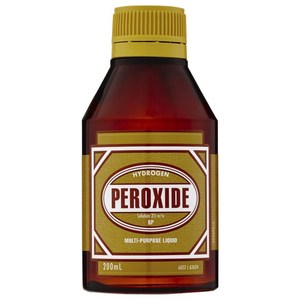Probably, every family has a bottle of this liquid at their disposal. Peroxide is known to be an almost universal cleaning remedy, and of course, we tend to apply it anywhere we need to clean mold and other unpleasant things.
But is this magical product so good indeed?
To make you aware of possible danger, we gathered several never-do-it-with-peroxide things one must never do with this chemical compound.
Read carefully and remember what must be avoided by all means.
What Is Peroxide In Fact?
This liquid that we all know so well is a chemical compound that consists of oxygen and hydrogen. It looks like a very pale blue liquid that is a bit more viscous than water. This stuff is used for bleaching, oxidizing, and as an antiseptic.
The compound is rather unstable and it easily decomposes when being exposed to light for quite a long period of time, that is why oxygenated water is sold and stored in the dark bottles.
People often get confused when they need to dilute this chemical for some purposes. To make it easier, we now provide you with a simple comparative chart which will finally answer the question of how much water and peroxide to blend!
[table id=44 /]
Never Do It With Peroxide. What to Avoid When Using This Chemical
At home, we often go for this compound when we are in need to clean something. It is perfect for whitening our kitchen linens, for dealing with dirty baking sheets returning them their initial shiny look, and for fighting bacterias.
For quite a long time, oxygenated water (that’s another name of peroxide) was considered to be a multipurpose cleaning liquid, but recent researches showed that it may not be that safe as people used to think.
Certain misuses of this chemical can be rather harmful to humans, and you’d better know what must never be done with this product.
Never go for it to treat deep cuts
Yes, years ago, this compound was used for treating cuts and wounds, and even today it is a staple in many first aid kits. But recent researches showed that applying it to cuts and scratches is harmful since H2O2 destroys the healthy cells around the damaged skin. Respectively, instead of speeding up the healing process, it delays it keeping the wound open longer.
Don’t use it without gloves
Oxygenated water is a chemical thus your hands must be protected when using it. Even though it is not toxic, the compound can easily burn the skin and even make your fingertips white!
Avoid it getting to your eyes
Since the compound has an irritative effect on skin and mucous membranes, it will also harm our eyes once getting in contact with them. So, if you are using this product for cleaning purposes, either wear protective goggles to avoid sudden splashes or just be very careful and keep your eyes away.
If peroxide gets into the eyes, flush them with a lot of water for fifteen minutes and visit a doctor. If you wear lenses, remove them before flushing eyes.
Never blend it with acetum
This is probably the most important never-do-it-with-peroxide thing! When being combined together, these two liquids create peracetic acid which is very corrosive and can easily damage our eyes, skin, throat, nose, and even lungs!
However, using these liquids in succession on the same surface is fine.
No ingesting!
Why would someone ingest it, you may ask? Well, probably nobody would do that for purpose, indeed, however, some people believe that intaking pure peroxide might be good for health, besides, since diluted peroxide is often used for flushing a mouth, some amount of it can be accidentally swallowed.
Never do that since this liquid causes abdominal stress, vomiting, and blistering in the mouth.
Don’t make use of it if it’s not fizzy
Fizziness is the sign that peroxide is still ok. If it’s gone, then the compound will most likely turn into water and won’t be effective anymore. The decomposed liquid is not harmful, but using it will also be impossible.

Don’t breath it in
Make sure you don’t inhale this chemical accidentally. If you did, seek for the fresh air. If someone breathed it in, and his/her breathing is difficult, administer oxygen. If a person doesn’t breathe, give artificial respiration, and go to the hospital instantly.
Exclude any skin contact
Peroxide is not toxic, however, it can cause bad irritation. So, if some of it dripped on your bare skin, flush it with water and apply emollient. If the contact was serious (e.g. a massive spill), apply disinfectant soap and antibacterial cream, and visit the hospital.

Don’t leave it anywhere
Peroxide must be kept away from heat, moisture, and any sources of ignition. Keep the bottle screwed tightly and far from organic materials, metals, acids, and oxidizing agents.
Don’t transfer the liquid to another tank
The compound is sold in the bottles that properly designed and vented for this purpose. Pouring it to another tank that’s not meant for it can be dangerous.
Never mix with acetone
These two liquids create extremely hazardous and explosive peroxides when mixed at high concentrations.

Don’t combine it with organic solvents
Such a blend will result in the explosive liquid that is dangerous for your health.
[wp-faq-schema title=”Frequently Asked Questions”]

Does hydrogen peroxide work as well as bleach? I know peroxide is quite harmful so maybe bleach could be a better option?
It does, and moreover, it is a way safer and environment-friendly bleaching agent compared to the chlorine bleach.
How do I make hydrogen peroxide clean something? Do I need to dilute it?
No, it must not be diluted. I just pour it into a pulverizer and spray on the surfaces I need to clean.
Can peroxide and vinegar be mixed? Both are good cleaners so I thought of combining them. Is that safe?
Good that you asked since it’s unsafe completely. These two create a strong acid that is very harmful, so never blend them together.
Hi! Please, help me to make a decision! Which is better alcohol or peroxide? Thanks in advance!
Hey! It does work better than rubbing alcohol for cleaning, but for treating wounds I’d not recommend any of them.
When should you not use hydrogen peroxide? Are there any cases when it’s forbidden to use?
I know for sure that it’s not good for healing deep cuts and serious bleeding wounds since it harms the healthy skin cells making the wound heal slower.
Can peroxide be used orally? I heard it kills bacteria if used as a mouth flush. Is that true?
When diluted, it can be used for flushing mouth indeed since it’s a mild antiseptic. But it must never be swallowed!
I’m often applying peroxide at home when cleaning but I recently heard it’s dangerous. Why is peroxide bad for you?
It’s bad mostly because it has an irritative effect on our skin, eyes, and respiratory system when getting in contact with any of them. So even if you just clean with it, wear gloves and protect your eyes, and try not to breathe it in.
Is mixing hydrogen peroxide and vinegar together safe? I heard that peroxide can be combined with other household products for better cleaning abilities, but I can’t remember which products exactly are safe, and which are not. Could anyone help me please?
I don’t know anything about the rest of possible combinations, but I know for sure that peroxide and vinegar are not equal to the safe blend! See, if you mix them together, you will get a peracetic acid, and it is extremely corrosive! If it gets into your eyes or nose, or onto your skin, it will be super painful!
Hi! I’m about to boost the cleaning powers of my peroxide bottle, so I’m thinking of adding some baking to it. But here is the question: can you mix hydrogen peroxide and baking soda?
Hello! Well, as far as I know, peroxide can be safely mixed with baking soda. You will get a paste-like substance as a result. You will need to mix two teaspoons of hydrogen peroxide and one teaspoon of baking soda. This solution can be used instead of a regular toothpaste. But I’m not sure that it will be effective for household cleaning purposes.
Hey everyone! I need your advice, folks, preferable from someone who is experienced in the topic. Is a mixture of white vinegar and peroxide good for mold?
Never mix these two ingredients together! They result in a very strong acid that can damage your skin, eyes, and even lungs once inhaled!
Can you mix hydrogen peroxide and rubbing alcohol for household cleaning purposes?
Basically, you can. If I remember it correctly, you will get a sanitizing solution as a result. But I would recommend you act very carefully in order not to drip rubbing alcohol onto your skin since it can get badly irritated.